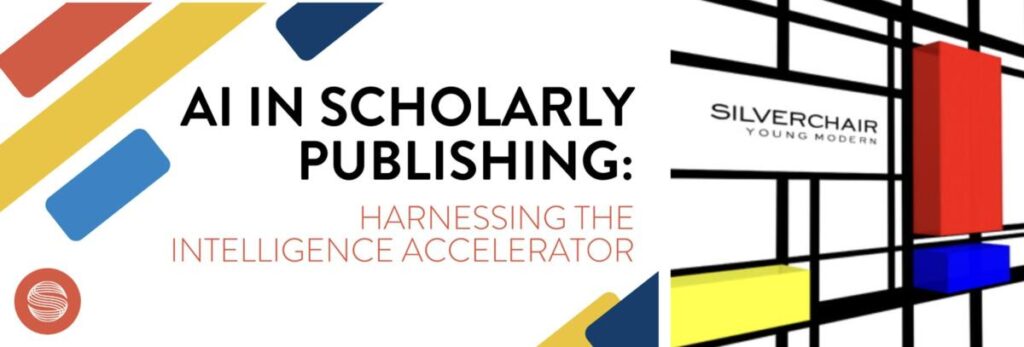Scholarly Publishing & Research
- AI in Scholarly Publishing: Harnessing the Intelligence Accelerator: Scholarly publishing (and the world at large) is undergoing an unprecedented period of change thanks to the rapid evolution and availability of AI and LLMs. In Silverchair’s new white paper, we share a look at where we've been, where we are, and where we're going as a scholarly publishing community. (Silverchair, September 2023)
- Publishers, Don’t Use AI Detection Tools! A post on the Scholarly Kitchen explores the limitations and potential collateral damage of current AI detection tools. “While the motivation behind integrating AI detectors in the academic review is well-intentioned, the challenges they introduce necessitate a different approach. The scholarly publishing industry must be vigilant, weighing the potential pitfalls against the promise and exploring ways to harmoniously blend AI into the academic literature.” (The Scholarly Kitchen, September 14, 2023)
- Hum Unveils Lodestone, Cutting-Edge LLM to Unlock Deep Insight: Silverchair Universe partner Hum announced Lodestone this month, the cutting-edge large language model optimized for long text sequences. Lodestone is the new "foundation model" for Alchemist, Hum's AI engine. With its ability to understand longer text sequences, Lodestone can read an entire research paper and surface content insights that other models wouldn't find looking at just one or two paragraphs at a time. (Hum, August 28, 2023)
- AI Tool-Up Tuesdays! Master AI Tools for Research: A webinar series from SciWriter looks at AI summarisation tools and how they can revolutionize scholarly publishing and research. Topics include discovery, image generation, research integrity, and more. (SciWriter, September 2023)
LEGAL & POLITICAL
- AI legislation, lawmakers and companies to watch right now: Axios Pro released a white paper covering an overview of the state of United States AI policy, profiles on key staffers and policymakers, impact insights on companies like OpenAI and Google, and legislative developments to watch this year. (Axios, September 2023)
- The New York Times blocks OpenAI’s web crawler: The New York Times has blocked OpenAI’s web crawler, meaning that OpenAI can’t use content from the publication to train its AI models. The change comes after the NYT updated its terms of service to prohibit the use of its content to train AI models. The NYT is also considering legal action against OpenAI for intellectual property rights violations. (The Verge, August 21, 2023)
- OpenAI seeks to dismiss majority of Sarah Silverman’s and authors’ claims in ChatGPT lawsuits: OpenAI has filed motions to dismiss five out of the six counts lodged in two copyright infringement lawsuits levied by two groups, one of which includes comedian and actor Sarah Silverman. The company's argument for dismissal rests on the transformative nature of its technology. It will be interesting to watch AI companies and content creators duke it out in court over the balance between copyright protection and technological advancement. (Venture Beat, August 29, 2023)
- Google and YouTube are trying to have it both ways with AI and copyright: Google's partnership with Universal Music Group (UMG) to develop an AI framework for copyright management is raising concerns over potential new private intellectual property rights and AI-generated content. While Google seeks to accommodate UMG's demands for royalties and content control, the situation underscores the evolving landscape of copyright law and AI's impact on online creativity and expression, and the potential for harm through deepfakes and similar tech. (The Verge, August 22, 2023)
- US Copyright Office wants to hear what people think about AI and copyright: Starting August 30th, the US Copyright Office will be accepting public comments regarding copyright issues related to AI, as they work to determine the best way to handle the challenges facing authors, artists, content creators and owners, and publishers in an AI-centric world. (The Verge, August 29, 2023)
General
- OpenAI opens GPT-3.5 Turbo up for custom tuning: OpenAI opened up GPT-3.5 Turbo for custom tuning, which allows the chatbot to focus on specific tasks, like code completion or maintaining a consistent tone, making ChatGPT more efficient. Also of note: no company data used for fine-tuning will be used to train OpenAI's models. (The Verge, August 22, 2023)
- I Secretly Let ChatGPT Take My Final Exam: A Vanderbilt professor had ChatGPT take their algorithm class' final exam, then shared the results with their students: the students did better than ChatGPT this year, but what about next year? This kind of experimentation underscores the importance of curiosity with this tech and thinking about ways it could transform our relationship to cognition and learning in the coming years. (Slate, August 30, 2023)
- IBM’s CEO, who froze hiring for thousands of back-office jobs and predicted A.I. would take up to 50% of new jobs, just piled into a $4.5 billion tech unicorn’s massive new $235 million funding round: IBM announced they are participating in the $235 million Series D funding round for Hugging Face. This isn't a surprising move, given CEO Arvind Krishna's emphasis on AI's staying power, and the fact that IBM has already contributed 200+ models to Hugging Face's platform. (Fortune, August 28, 2023)
- Visualising AI: Artist-created images and animations about artificial intelligence (AI) made freely available online: As we begin to glimpse what AI will mean for art and its audiences, Google DeepMind unveiled a new exhibition, "Visualizing AI," in which 13 artists explore the risks and visualize the opportunities of AI. The artwork includes commentaries on AI and work produced using AI. (Axios AI, September 2023)
Just for fun
One of our clients noted a familiar theme in our AI white paper graphics…
To keep up on future reading lists and other community & industry updates, subscribe to our monthly email newsletter.
